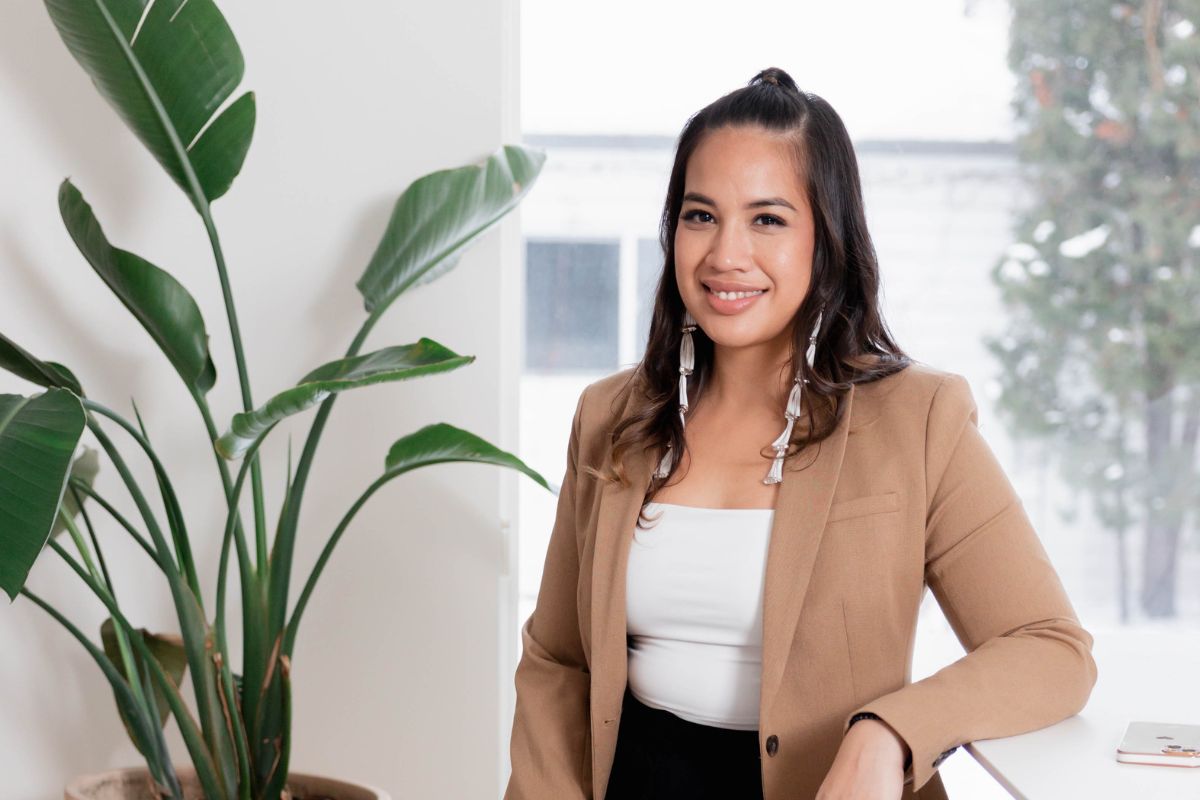
Where community begins
Asper and IBEP alum Ashley Richard on creating spaces for connection, supporting women entrepreneurs as WEKH Indigenous Lead
Ashley Richard’s [BComm(Hons)/17] first Asper community grew out of a too-small student lounge for Indigenous business students on the third floor of the Drake Centre. “It was tiny, and there would still be 15 of us cramming our way in there, working uncomfortably on our laps,” she recalls.
“But that was where we wanted to be. We wanted to be together.”
The Indigenous Business Education Partners (IBEP) lounge, which has since moved to a larger, more suitable space, was a meeting place for Richard, and the ecosystem that IBEP created for Indigenous business students has grown beyond a cramped, if not cozy, office.
“IBEP created a space for friendships that last even today,” she says.
Richard, who is now Lead of Women Entrepreneurship Knowledge Hub (WEKH), Indigenous, can recall many connections that began at Asper through IBEP, made with people that she still actively works or keeps in touch with.
As an Asper student, she developed a keen understanding of the value of sustaining community and of creating space for more Indigenous leaders and innovators.
“That was the vision I had from day one: I wanted that closeness to continue. For instance, I knew it was important to keep [UM Indigenous Commerce Students] alive when I graduated, and I wanted to find people earlier in their BComm who had that same passion.”
Richard’s vision for WEKH is not unlike this approach—her focus is never solely on her own success, but on creating that space and those opportunities for other Indigenous women entrepreneurs.
“WEKH is centered around building relationships and an inclusive innovation ecosystem for women entrepreneurs across the country. I work to share information, build connections and establish understanding between the various organizations that support Indigenous women entrepreneurs,” she says.
“These ecosystems need to offer support while ensuring Indigenous women have full control over what they are creating. It’s not just about providing pockets of funding specifically for Indigenous communities; it’s about creating that space for passion, innovation, connection and allyship.”
Asper is home to the Manitoba Hub and the National Indigenous Hub of WEKH, a Canadian network and platform for sharing research, resources and leading strategies for women entrepreneurs. Richard leads the National Indigenous Hub, while Director of the Burns Leadership Institute Suzanne Gagnon and Director of the Stu Clark Centre for Entrepreneurship Debra Jonasson-Young lead the provincial chapter.
For Richard, the aim of WEKH is not just to support individual entrepreneurs, but to create spaces for more Indigenous women to succeed in entrepreneurship by providing community and opportunities for connection.
“We have put a lot into building these relationships within the network, where now amazing things can happen without me or WEKH itself planning events. We’ve been able to focus more on supporting the events and resources that members of our network plan rather than running everything directly from WEKH.”
WEKH has built this ecosystem across a vast national network, with opportunities to connect in-person, but with an intentional focus on sustaining relationships across the country.
Where connection lives
Richard understands that her role is not just to create connections, but to create a space where connections can grow and flourish in unexpected ways, to create a reliable touchpoint for establishing and revitalizing professional relationships, to be attuned to the echoes of past or intergenerational connections.
She values reconnecting just as much, reaching out to her old teachers who saw her as more than a problem student, telling them how much their connection—however brief—impacted her story. She recalls a young woman and public speaker doing the same to her. While she values knowing about this impact and informing her own mentors about their influence, she is careful not to make that acknowledgement the reason for her work.
“Be a positive part of other people’s lives as best you can, but don’t do it for the promise of credit down the line. Do it because you want to and accept that you may never find out whose life you affected. There will be signs along the way that you’re on the right path.”
At WEKH, the signs are a robust network of women entrepreneurs empowered to create and connect, guided by Asper leaders and innovators.
At IBEP, the signs include a community of 182 alumni (whose time in the program created lifelong friendships), a lasting potential for new connections and a 30-year legacy of supporting Indigenous business students in their pursuit of leadership, innovation and impact.
—
In the upcoming year, WEKH Indigenous is looking forward to partnering with both Indigenomics and the National Aboriginal Capital Corporations Association on two events that will create opportunities for Indigenous women entrepreneurs to thrive. Learn more here.






